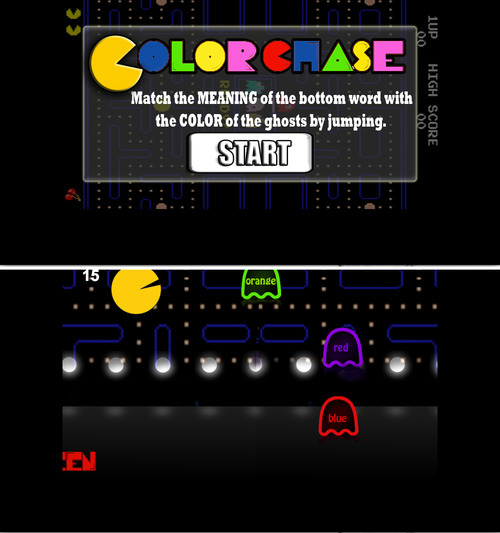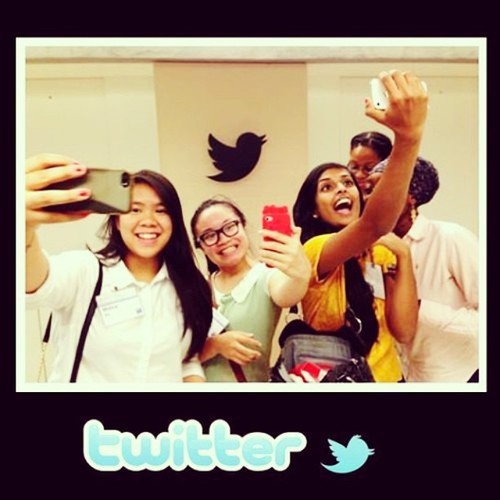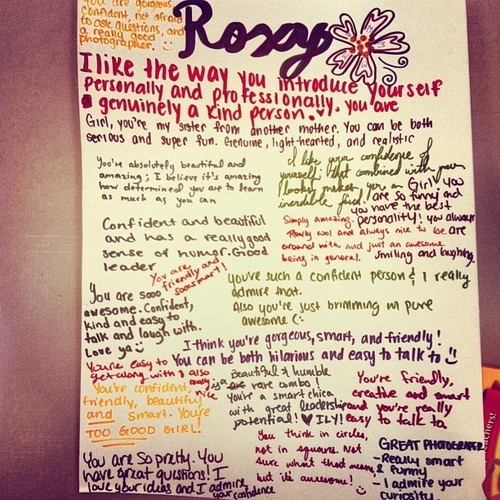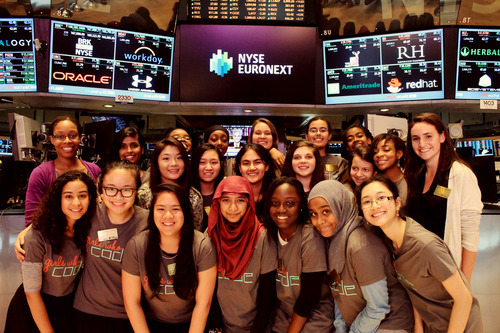"Girls Who Code aims to provide computer science education and exposure to 1 million young women by 2020."
--girlswhocode.com
Here's my interview with 18-year-old Girls Who Code alumna Roxy Banik.
Roxy: I remember that on the first day of science class in middle school, we were asked to draw a scientist on a blank sheet of paper. Practically everyone in the class drew a nerdy male in a white lab coat holding a test tube, when in reality anyone can be a scientist. It's no different with computer science. Many girls envision a computer scientist to be a geeky male wearing a plaid shirt typing away at his computer, which deters them from trying.
Emma: You're a design gal, so what did you draw?
Roxy: I hate to say it, but I also drew a male at the time. What's funny is that I actually was asked to do this same exercise during a summer program, and that time I made sure to draw a female scientist.
Emma: I bet I would have drawn Einstein or some crazy dude with white hair all over the place who never showers because he is busy with ideas. However, if I were asked now, after talking to you, I would not be caught dead drawing that. Progress just happened!
Roxy: Sheryl Sandberg talks about stereotype threat, which is the idea that people who are made aware of negative stereotypes are more likely to perform in accordance with those stereotypes. We see this in so many contexts, but it's especially prevalent in the field of computer science. It's time to rewire our brains to recognize both males and females as mathematicians, scientists, etc.
Roxy's team's first-place-winning game from Spring Break Game Jam
Emma: Did your idea of what makes a computer scientist change overnight, or were there confidence hiccups along the way?
Roxy: I think it's possible for anyone, male or female, to be intimidated by a new concept. The difference with Girls Who Code is that we were encouraged to acknowledge this reality instead of ignore it. We took it upon ourselves to support another girl if she felt nervous presenting or pitching. We were encouraged to struggle together and fail, whereas in a school setting (which often tends to be co-ed), there can be a competitive nature among students that no one does anything about.
Field trip to Twitter
Emma: How do you define yourself? I say, "I'm a comedian and writer." Who are you, in brief?
Roxy: I'm a graphic designer and coder. I've been obsessed with Photoshop since I was in sixth grade.
Programming Arduinos, a Project of the Week during Girls Who Code
Emma: What makes you angry?
Roxy: I've had [someone] tell me, "I'm a male in finance. You'll never make more money than me."
Emma: Oh, so you have to make more money than him. He made that so easy for you!
Roxy: Going into a career field where females are underrepresented means developing emotional resilience for when someone reminds you of it. His comment might be the first of many.
Emma: Right. It's a practice round for when you move to Silicon Valley.
Roxy: Mmhmm! My biggest support system is my family at Girls Who Code. The guidance and support doesn't end once the eight weeks are over. I feel so lucky to be a part of a group of people where I've experienced no negativity whatsoever. Coming from a competitive high school, the program was the first time I felt as though every single person in the room was rooting for me.
The girls make positivity posters for each coder to get her head in the game.
Emma: I remember that competitive school feeling. In retrospect, it does seem less useful than the idea of struggle and failure, which is more conducive to learning and represents the "real world" a lot better.
Field trip to the New York Stock Exchange
Roxy: In Reshma Saujani's [founder of Girls Who Code] Makers interview, she says that we live in a society that's ashamed of failure. It's not easy to welcome failure, but by embracing it we relieve ourselves of the pressure to perform flawlessly, and we become more fearless. Adopting this outlook has made me approach new experiences with the mindset: I'm here to do my best and to learn, not just to win something.
Emma: When you are a CEO, what will the mission of your company be?
Roxy: The mission of my company will be to encourage employees and people to do what scares them. Progress comes with disruption, so you should never be afraid to try something new.
Emma: Yaaas! I hope I have some money to invest in your company when the time comes. As of right now I'd have to invest in office snacks.
Roxy: I'm a Welch's addict, so that'd be wonderful!
Emma: OK! I can spring for some gummy snacks. I think they taste terrible, but whatever. It's your office!





